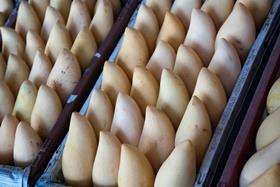
Thai-based company Exoriens hopes to make mango exports to the US viable through a research project investigating a link between fruit ripeness and black spotting as a result of irradiation treatment.
Currently Thai mangoes are not sent to the US because irradiation treatment, which is required under the US protocol for the shipment of mangoes to that country, causes black spots to form on the skin of the fruit.
Exoriens export manager Peyton Enloe said that while buyers in the US have expressed interest in the Nam Doc Mai mango variety, which is prized for its golden colour and intense sweetness, any skin blemishes would undermine its status as a premium fruit. “We have consumer interest, its just about getting them a product of the right quality,” he told Fruitnet.com.
The variety would have to be sent to the US by air, and would have to garner a high price in retail markets to be a viable export.
In an effort to address the problem with spotting, Mr Enloe said Exoriens, in conjunction with the US Animal Plant and Health Inspection Service (APHIS) will conduct a series of tests to investigate if ripeness has any bearing on the spotting of fruit.
This will involve treating half pallets of the fruit at differing levels of ripeness, which have been sourced from the same lot, he says. The hope is that it may result in isolating a particular ripeness at which fruit does not form black spots after treatment.
Exoriens currently runs a mangosteen programme into the US and Mr Enloe explained mango exports would complement this.
Currently the majority of Exoriens’ mango exports go to Germany and Mr Enloe said the company sends two shipments there a week. New Zealand also provides a spot market for Thai mangoes and the company sends fruit there when there is demand.



